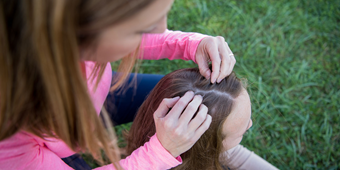Your Guide to the ‘Kissing Disease,’ Mononucleosis

Answer a few questions and we'll provide you with a list of primary care providers that best fit your needs.
Mononucleosis (or mono) is widely known as the scourge of amorous adolescents, hence its nickname, “the kissing disease.”
But kissing isn’t the only way this illness is transmitted, and teenagers aren’t the only people affected. While mono is rarely life-threatening, it is an especially dreaded illness. That’s because the symptoms, like sore throat, extreme fatigue and fever, can make you miserable, and recovery can take weeks. The fatigue caused by mono is especially hard to shake.
Education and prevention are key in preventing and treating mono. Here’s what you need to know.
What Causes Mono?
Most cases of mono are caused by the Epstein-Barr virus (EBV), which is part of the herpes virus family. There are other viruses that can cause it as well, although rarely. Most of us contract EBV at some point in our lives, and in most cases, it’s mild, harmless and doesn’t cause mono.
After you recover from EBV, it stays in your body permanently. Usually, it lies dormant, but occasionally, it “wakes up” and can reactivate without symptoms.
Whom Does It Affect?
According to the Centers for Disease Control, mono is a fairly common disease, affecting one in four teenagers and young adults, especially college students. However, it can affect people of other ages.
How Does It Spread?
There’s good news and bad news here. Mono doesn’t spread easily, but it’s extremely difficult to prevent since it lies dormant in people who often show no symptoms.
Basically, it spreads through the sharing of body fluids. Kissing appears to be the most common way of transmitting the virus. However, it can also be passed through exposure to a cough or sneeze, or by sharing drinking glasses, spoons and forks. Rarely, it can spread through blood and semen during sexual contact, blood transfusions and organ transplantations.
If you get mono once, you seldom get it again.
What Are the Symptoms?
Usually, you won’t see symptoms until four to six weeks after being exposed to it. Symptoms in young children are typically mild, while symptoms in adolescents and young adults tend to be more severe. Each person may experience symptoms differently, and may not experience all symptoms at the same time.
Some of the most common symptoms include:
- A high fever
- Sore throat
- Extreme fatigue
- Head and body aches
- Weakness
- Rash
- Swollen glands in your neck, armpits and/or groin
- Loss of appetite
- Night sweats
- Anemia
- Temporary jaundice, yellowing of the skin and whites of the eyes due to excessive bilirubin (bile pigmentation) in the bloodstream, caused by mild liver damage
- Enlarged liver or spleen, or both
The symptoms of mono are similar to those of other medical conditions. Always talk with your health care provider for an accurate diagnosis.
How Is Mono Diagnosed?
Doctors usually diagnose mono based on your symptoms. However, some physicians may choose to order blood tests, including a heterophile antibody test, or monospot test.
If you have mono, your blood work may show:
- More white blood cells than normal
- White blood cells that look unusual
- Fewer than normal neutrophils (a type of white blood cell) or platelets
- Abnormal liver function
- Antibodies produced by your body’s immune system in response to a mono infection
Kissing appears to be the most common way of transmitting the virus.
How Is Mono Treated? Is There a Cure?

There is no cure for mono, and because it’s caused by a virus, antibiotics won’t help. Your best bet for getting through a case of mono is to take care of yourself. Typically, this means you should:
- Rest, to give your body’s immune system time to fight the virus
- Drink plenty of liquids to help prevent dehydration
- Take over-the-counter acetaminophen or ibuprofen for discomfort and fever
- Gargle with salt water, or suck on throat lozenges, hard candy or frozen treats (like Popsicles) if you have a sore throat.
Are There Complications?
Sometimes. The most likely complication from mono is enlargement of the spleen, an organ on the upper left side of your abdomen that helps filter blood. As such, you should avoid playing contact sports until you’re fully recovered, because a hit to the body can cause your spleen to rupture.
A ruptured spleen is rare, but it’s important to know the signs. These include a sharp pain in the left upper part of your abdomen, lightheadedness, confusion, blurred vision and fainting.
How Long Does It Last?
Mono can last anywhere from a week to several months, although most cases last from two to four weeks. The fatigue that comes from mono can be especially hard to shake.
Talk to Your Doctor
Mono can resemble a number of other illnesses. If you have any concerns or want to determine whether you or a loved one has contracted it, contact your doctor. She’ll be able to pinpoint the exact cause of your illness and then work with you to get you on the mend.
Answer a few questions and we'll provide you with a list of primary care providers that best fit your needs.
Source: Centers for Disease Control; American Academy of Family Physicians/FamilyDoctor.org; American Academy of Pediatrics




